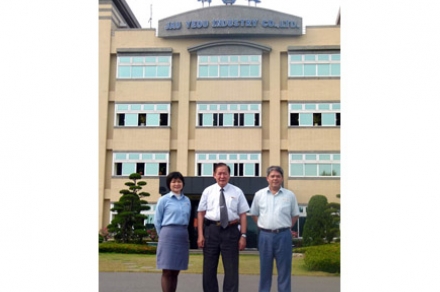“BOSS PRECISION WORKS” Enters Japan Market with Its Own Might


The company’s foreign sales take up an amount of 95%, among which, exports towards Japan take 35%. Mr. Wei-Ting Chiu says that this is still uncomparable to a major manufacturing plant. Humble as he is, we can still see that the company holds a better grip on the Japanese market. Patented by ISO9001:2008, the company features construction small screws. To cope with production cost, the company’s plant only contains quality control and packaging, while the production process is conducted by credible assisting firms with long-term cooperative relationship. This is because the plant is relatively smaller and it is not cost effective to pay for the cost of on-site operating technicians. Boss Precision Works is a company that relies on trades more than manufacturing.
When it comes to tips for market expansion, Mr. Wei-Ting Chiu pointed out three guidelines: language, popularity, and no haste.
Language: The First Step to Draw Intimacy
Although language is not directly proportional to number of successful deals, it is definitely not inversely proportional to mental distance. Just like English, if we take the Law of Attraction into account, would you choose “the same language”, or “a different language”, to talk with another person? No matter how immerse the will to cooperate, limited amount of vocabulary will restrain the depth of mutual understanding. Language competence can effectively draw you away from rivals, and draw you closer to cooperators.
Find the Right Stage to Expose Your Brand to Accumulate Popularity
“Exhibition” is an effective path to opening up popularity. Japanese firms mostly seek out for cooperating opportunities through attending local major exhibitions. If you are taking the initiatives to enter a mature market with no guarantee of success like Japan, setting up a long-term plan to look for the right stage to shine will return you with substantial rewards.
Auditing Process Is Not So Much Terrible If You Understand Japan Business Culture
Upon attempts to cooperate with a Japanese firm, the auditing process by the Japanese is often like a time-consuming marathon race that becomes one of the reasons that hold back many foreign companies. The characteristics of Japanese market can be described as “slow work yields fine products” and “small showers last long; sudden storms are short”. If you get to know the Japanese business culture, the auditing process is not as terrible as you may imagine.
The length of auditing process is somewhat related to company scale. It usually takes years to go through the procedure from releasing cooperation acknowledgement to signing final contract. Chances are that the cooperative relationship is still not established eventually after the long wait. Mr. Wei-Ting Chiu says, “No haste because in this way we will get a deeper understanding on clients needs. At least in the auditing process, Japanese firms always irregularly inform us of their internal status. Such business attitude makes you feel respected, and whatever outcome will become a chance to reflect on ourselves for self-elevation.”
Even if Japanese yen has been through drastic fluctuation in recent years, they still receive stable volume of purchase orders. In terms of market trends, Japan still greatly relies on Mainland China, which is more so if China becomes the largest economic entity in the future. To conclude, if you want to cooperate with Japan, Mr. Wei-Ting Chiu thinks it is important to “go with the Japanese business pattern instead of reacting to them in Taiwanese way”.








